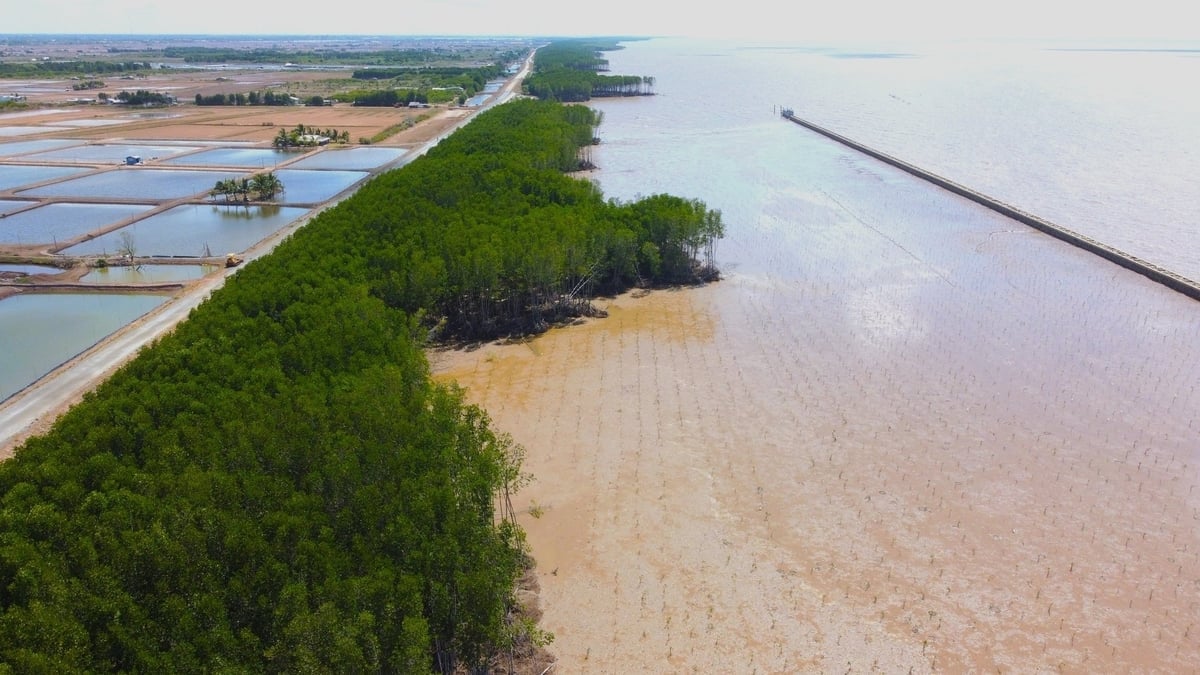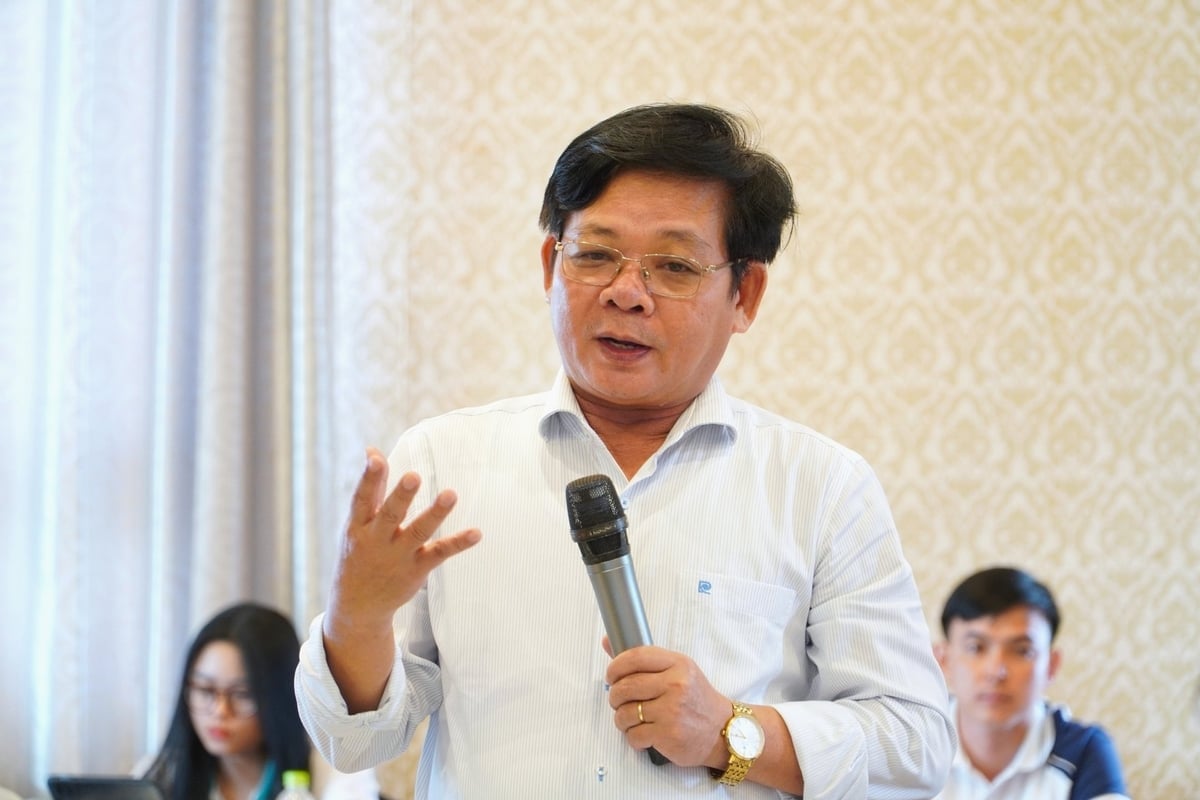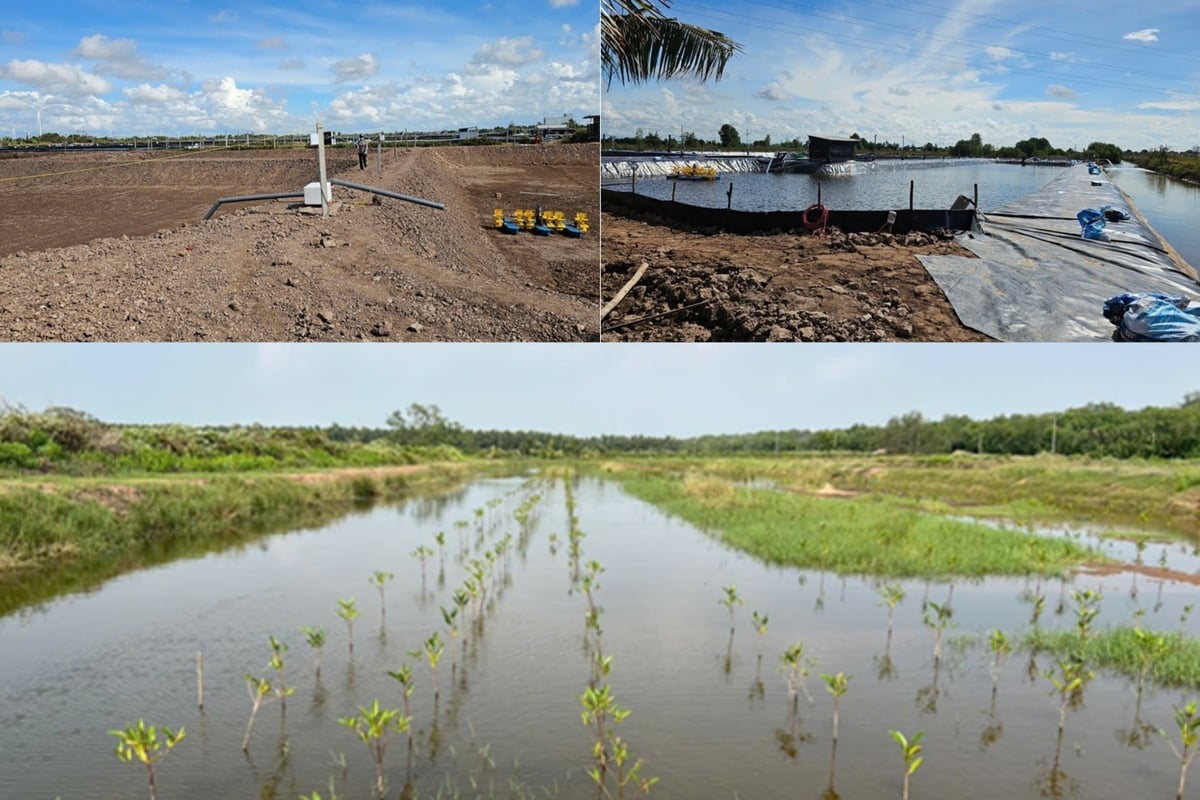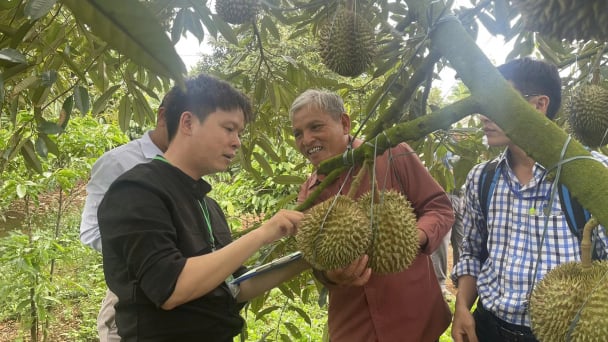May 31, 2025 | 12:10 GMT +7
May 31, 2025 | 12:10 GMT +7
Hotline: 0913.378.918
May 31, 2025 | 12:10 GMT +7
Hotline: 0913.378.918
A recent survey conducted by the Southern Institute for Water Resources Planning reveals that coastal areas in the Mekong Delta, especially in the five provinces of Tien Giang, Ben Tre, Tra Vinh, Soc Trang, and Bac Lieu, are currently facing two major and growing challenges: the increasingly serious problem of coastal erosion and the pollution of water sources in aquaculture zones.
Although in recent years, central and local authorities have implemented numerous programs, plans, and studies aimed at protecting sea dikes, developing forests, and promoting sustainable aquaculture, many of these efforts remain fragmented and lack long-term connectivity.

The sea dike in Vinh Hai Commune (Vinh Chau Town, Soc Trang Province) is frequently hit by ocean waves, causing erosion at the dike’s base. Submerged breakwaters have been constructed offshore to reduce wave impact and promote sediment accumulation. Photo: Kim Anh.
Aquaculture has long been a key economic strength of the Mekong Delta region. However, production efficiency among farming households is gradually declining due to the increasing pollution of water sources. In many coastal areas, the drainage of wastewater is severely hampered by a lack of synchronized canal and ditch systems. This has led to a buildup of pollution over time, which directly affects the productivity and quality of aquaculture activities.
At the workshop titled “Current status of coastal protection and the potential for applying hybrid nature-based solutions", held on April 24 in Can Tho City by the Southern Institute for Water Resources Planning in collaboration with the International Union for Conservation of Nature (IUCN), experts introduced a new integrated approach: the implementation of Hybrid nature-based solutions (Hybrid NbS).
One notable initiative presented was the study of utilizing coastal seawater as a water source for aquaculture, and then reusing the discharged wastewater to irrigate and nourish coastal forests. This solution aims to create a circular model that not only helps protect the environment but also contributes to the restoration and sustainable development of coastal forest ecosystems.

Mr. Do Duc Dung, Director of the Southern Institute for Water Resources Planning, shares insights on the solution of using seawater for aquaculture and forest cultivation. Photo: Kim Anh.
According to Mr. Do Duc Dung, Director of the Southern Institute for Water Resources Planning, coastal seawater in the Mekong Delta is of good quality and suitable for aquaculture. The proposed model aims to create a circular water system, which not only protects the environment but also ensures sustainable production. However, more time is needed to validate the model, and a clearer assessment is expected by the end of 2025.
Dr. Nguyen Nhut, from the Research Institute of Aquaculture II, further emphasized that the development of mangrove forests is a prerequisite for ensuring sustainable aquaculture practices.
Dr. Nhut explained that even when using renewable energy or eco-friendly production processes, such as feed and seedling production, carbon emissions are still generated. Therefore, to offset these emissions, the presence of forests is essential.
Additionally, forests provide tremendous biological value. For example, the leaves of Rhizophoraceae trees are being researched for their potential to treat white spot disease in shrimp or for use in medicine. Each hectare of mangrove forest can yield up to 5 tons of fruit annually. Similarly, producing 1 kg of snakehead fish requires 7 kg of Avicennia marina leaves - an ingredient highly sought after by businesses. However, current regulations do not permit the extraction of forest products.
“To develop forests, we must view them as a directly profitable asset for local communities. People must be allowed to harvest, process, and extract biological activity from the forest in a controlled manner,” Dr. Nhat suggested.

Some models of recirculating shrimp farming combined with mangrove forest cultivation. Photo: IUCN.
At the workshop, Mr. Nguyen Thanh Phong, a representative from the IUCN, introduced a more detailed approach for developing the Hybrid Nature-based Solutions (Hybrid NbS) model on "red book" land - land that allows for forest planting on private property.
According to Mr. Phong, the Mekong Delta faces a range of challenges, including a lack of fertile alluvial deposits, coastal erosion, and rising sea levels. These issues cannot be addressed solely through engineering solutions like sea dikes. Instead, he emphasized the need to integrate nature-based solutions, such as building offshore breakwaters to reduce wave impact, while simultaneously planting forests inland. This dual approach not only offers coastal protection but also provides livelihoods for local communities, enhances carbon sequestration, and contributes to overall environmental sustainability.
To support local farmers in transitioning to this model, IUCN proposes a shift from traditional intensive shrimp farming to high-tech aquaculture systems that require less land and increase overall efficiency. This shift would free up additional land that could be used for reforestation efforts.
"In this model, the forest functions not just as a green barrier to protect the coastline but as an essential component of a closed-loop wastewater treatment system. This system doesn’t rely on external water sources, thus reducing disease risks while promoting clean and sustainable aquaculture practices", Mr. Phong explained.
Currently, IUCN is piloting the Hybrid NbS solution, with an ambitious goal of restoring 18 hectares of mangrove forest in the provinces of Bac Lieu and Soc Trang. The initiative aims to positively impact 500 farmers and sequester more than 3.000 tons of CO2 over the course of the project.
Translated by Phuong Linh

(VAN) For the durian industry to succeed, the value chain must fulfill its commitments to the government, the community, and international partners.

(VAN) Vaccinating juvenile pangasius helps reduce disease, antibiotic use, and farming costs, increasing profits for export-oriented farmers in An Giang.

(VAN) Due to a limited supply of workforce and competitive recruitment requirements, businesses struggle to retain talented veterinary human resources.

(VAN) WOAH’s guidance aims to mitigate disease risks through a One Health approach that balances economic, conservation, and public health interests.

(VAN) Ms. Nguyen Thi Dung, Deputy Director of Ngoc Hoang Cooperative, shared about the journey of bringing dragon fruit to Europe, achieving annual revenues in the billions of VND.

(VAN) Bamboo products from Thang Tho Bamboo Cooperative have reached many countries around the world, while also creating jobs for local workers.

(VAN) The Management Board of Con Dao National Park reported that a green sea turtle, tagged in the Philippines, has traveled thousands of kilometers to lay 84 eggs on Bay Canh Islet.